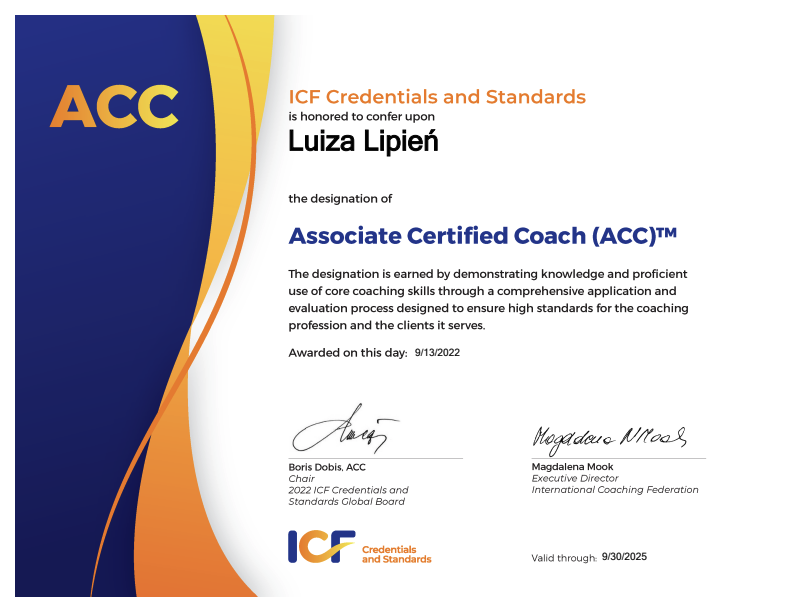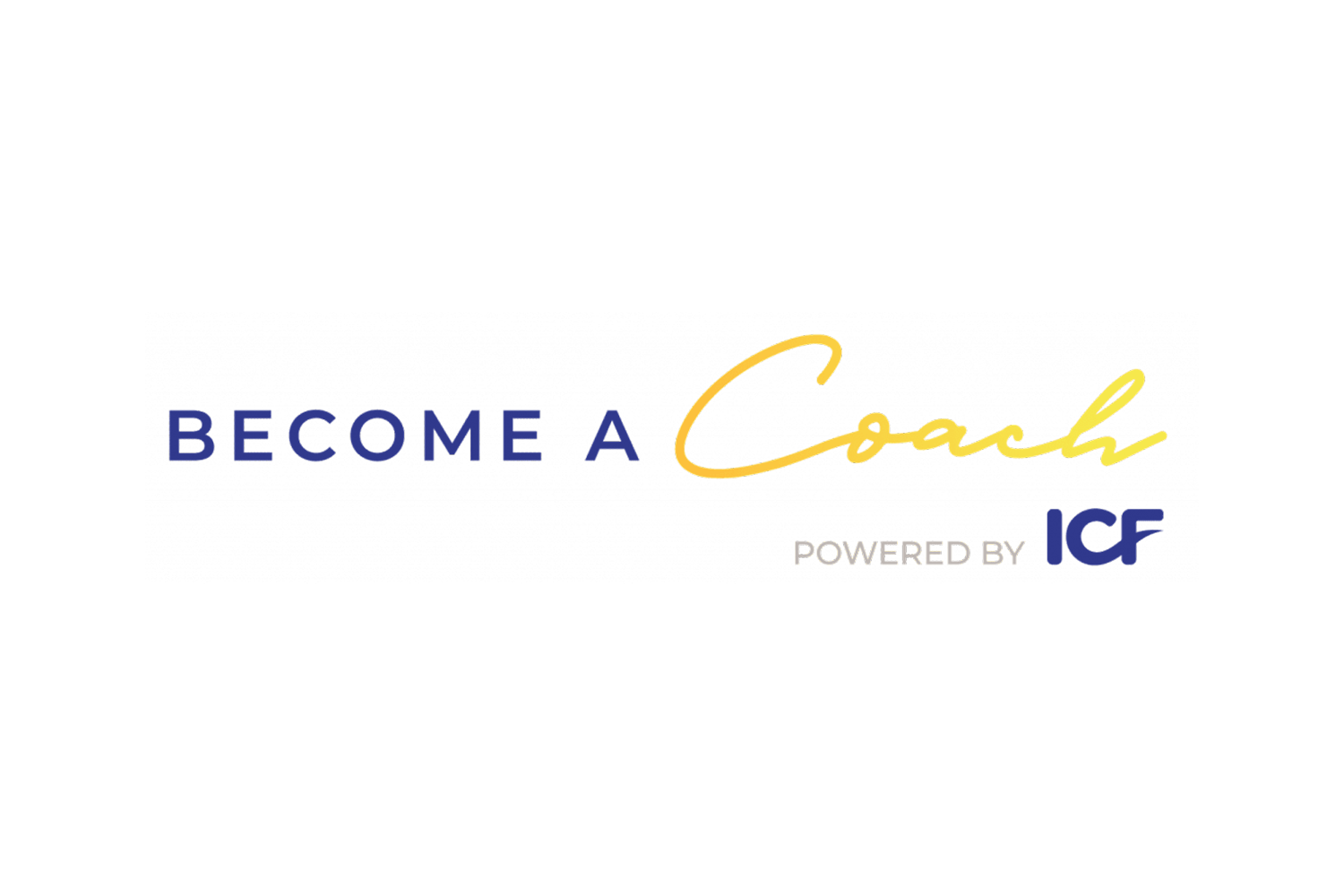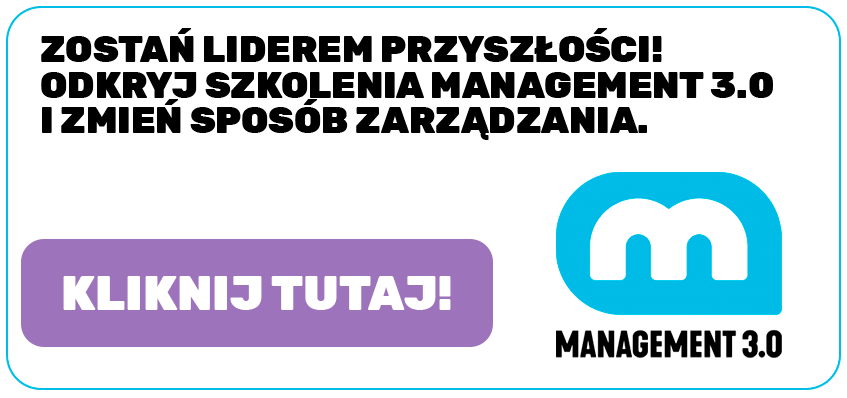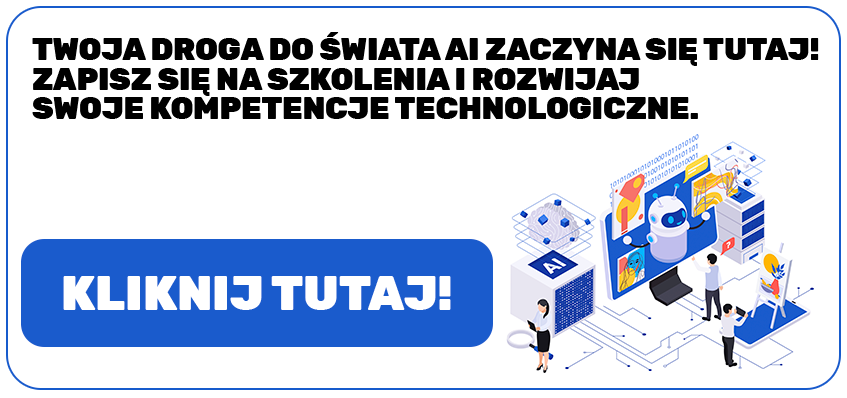How did I do it and was it worth it?
Since September I have been a certified coach of the International Coaching Federation, specifically an Associate Certified Coach (ACC). My path to obtaining this certificate was long – 9 years! But not because it is so demanding - although it is indeed not the easiest one - in my case, it was more about whether this certificate is necessary for me. And it took me a while to find the answer to this question. In this article I will talk about my journey and discoveries.
How did it start?
I first encountered the concept of 'pure' coaching in 2012. Intrigued, I decided to engage in the coaching process myself to explore the question: in what professional direction should I develop? Every two weeks, I met with my coach to dedicate time solely to myself, in their presence, delving deep into self-discovery. It proved to be a revelatory, captivating, and profound experience, granting me insight into my needs and fears. Through my coach's guidance, I gained a deeper understanding of myself, including the recognition of my talents with CliftonStrenghtFinder (which I highly recommend!).
I didn't stop at fascination. The following year, I decided to take part in coach training myself. It was during this time that I learned how coaching differs from mentoring. Coaching involves 'accompanying a client in a creative process that inspires and maximizes their professional and personal potential.' My coach and mentor during this journey was wonderful Anna Pyrek.
I was fascinated and enchanted. While working as a Scrum Master at that time, I could already envision my superb team in my mind's eye, which I "accompany" in their daily work by asking key coaching questions and contributing to “maximizing” their “potential” during individual coaching sessions.
My team quickly called me to order, expressing their satisfaction with my newfound skill (read: toy), but also expecting concrete actions from me and the specific assistance I had received thus far. To this day, I am very grateful for these suggestions to my team, because this situation made me contemplate the role of a Scrum Master. It led me to the realization that while a Scrum Master can indeed act as a coach, this is not their sole responsibility (and this realization occurred long before great Barry Overseem's article on the 8 attitudes of a Scrum Master).
Then, over the following years, I acquired insights into group and team coaching from NOVO trainers. Here, I learned about how teams function as cohesive units, how to foster harmonious cooperation, and how to cultivate shared understanding and values. This was another invaluable source of knowledge, for which I am extremely grateful.
As time went on, I transitioned into a managerial role. While coaching skills remained highly relevant in my day-to-day work, I also found myself drawn to exploring other interesting areas, such as Management 3.0. Consequently, certification in coaching gradually took a backseat.
Why did I decide to get the certificate?
quickly grasping the team's dynamics and relationships through gestures, words, and behaviors. I felt a sense of loss. I also sensed the need to reconnect with something that had brought me immense joy. Thus, I returned to the paused coaching certification process.
From my perspective, it served as a remedy for the pandemic-induced void in interpersonal connections. Delving deeper into my motivation for this decision, I realize that this is how I see it within myself. However, becoming a certified coach also offers numerous external, tangible benefits. Here are some reasons why becoming certified as an ICF coach is worthwhile:
- Trust and credibility: ICF is one of the most recognized and respected coaching associations in the world. Being certified shows a high standard of professionalism and ethics, which increases the trust of clients, employers and other professionals.
- Professional standards: Obtaining ICF certification requires meeting strict educational, ethical, and practical standards, confirming you are prepared to deliver exceptional coaching services in accordance with international benchmarks.
- Increased competences: Through this process of obtaining ICF certification, your coaching and theoretical skills are assessed. This helps you develop as a coach, improving your skills and knowledge.
- Market competitiveness: In today's competitive professional environment, ICF certification can help you stand out from other coaches. Many clients and organizations prefer to work with certified coaches, which can increase your chances of getting clients or a job.
- International reach: ICF operates worldwide, which means that the ICF certificate is recognized and accepted in many countries. If you have plans to expand your coaching practice into the international market, then the ICF certification can be invaluable.
- Contact network: With ICF certification, you have access to a global community of coaches. This can help you establish contacts, exchange experiences and develop professionally.
What does the certification process look like?
If you feel that you also want to go this route, you will find tips on how to do it in this paragraph.
If you're considering pursuing certification as a coach, here are some insights into the process.
The International Coach Federation (ICF) offers several levels of certification for coaches, including the Associate Certified Coach (ACC) certificate. To apply for this certificate, you need to complete several steps:
- Coaching training: To apply for ACC certification, you must complete at least 60 hours of coaching education. This may include ICF-approved training, courses, or academic programs. Please note that not every training provider is accredited by the ICF.
- Ethical education: Familiarity with and adherence to the ICF Code of Ethics is essential. Typically, the Code is integrated into the training provided by accredited institutions.
- Mentoring: You must complete a minimum of 10 hours of mentoring with an ICF accredited coach.
- Practice: Document at least 100 coaching hours spent in sessions with clients.
- Registration and payment: Along with the certification fee, you'll also need to pay an ICF membership fee.
- Practical skills exam: Record a coaching session with a client and submit it to an ICF evaluator for review. Submit the audio recording along with the script. The session should last between 20 and 60 minutes.
- Theory exam: Following the practical skills exam, you'll be invited to take a written exam, administered online. The exam typically consists of numerous questions (up to 155 in some cases) and allows 3 hours for completion. It's advisable to ensure you're well-rested and have a quiet environment for the duration of the exam.
- Certification decision: Upon passing the theory exam, you'll receive your certification! As beautiful and shiny as mine below:

- Maintaining the certificate: Obtaining a certificate is not the end of the road. Once you have your ACC certification, you must maintain your coaching activity and attend regular follow-up training to keep your skills current.
Note: all the above steps can be completed in Polish. Details of the requirements can be found on the website Associate Certified Coach (ACC) credential.
Was it worth it?
Oh yes! I especially realize it now as I write this article. Being with a group and in a group during the difficult time of the pandemic and lockdown satisfied my necessary need to belong, to be with someone in the process. Returning to the coach's values and ethical principles organized my knowledge and gave me the opportunity to gain closure. It is always worth developing, and any good training is a great opportunity to develop self-awareness and interpersonal skills. I met a wonderful mentor who supported me during the training, throughout the certification process and beyond. Małgosia, I bow down!
What else? I met new people! And in times of pandemic and limited contacts, it was wonderful! The concept of Cocha's "wealth" also came back to me, a bit dusty and standing in the corner. It says that in the coaching process, not only the client is important, but also YOU as a coach, as a person. What matters is how you feel, how prepared and calm you are, whether you have readiness and space. Once I dusted off this concept, I felt relieved. Such a relief that I don't have to tense up. Both as a coach, but also in any other activity. My wealth is ALSO important. It's very liberating.
To sum up, if you decide to go for it, the certification process can be a great adventure for you. You can decide that it will be a quick attack to the top, where you will certainly have a lot of joy, satisfaction from the effort, and beautiful views. You can also take your time - like I did - and there is nothing wrong with that, because the point is to gather experiences and reflections, learn about yourself and others. There are no better or worse ways. Every path you choose is good because it is YOURS.






